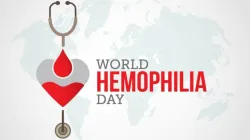World Hemophilia Day 2024: What happens to a hemophiliac after an injury? Expert explains
Raising awareness about hemophilia is crucial. As we mark World Hemophilia Day, let's strive to understand the challenges faced by those living with the condition and support advances in treatment and care.

On this World Hemophilia Day, let's shed light on the life-altering condition that affects approximately 1 in 10,000 people worldwide. Hemophilia, a rare genetic disorder, hampers the body's ability to produce clotting factors, vital proteins that control bleeding.
According to Dr Madhav Danthala, Consultant Hemato-Oncologist and Bone Marrow Transplant Physician, Yashoda Hospitals Hyderabad, a trivial injury for most can turn into a life-threatening situation for a person with hemophilia. Here's what happens: When a hemophiliac sustains an injury, their blood lacks the necessary elements to form a clot, and the bleeding continues far longer than it would for an individual without the condition.
This excessive bleeding can lead to significant concerns. In the case of an external wound, it could result in substantial blood loss. However, internal injuries are often more dangerous, leading to bleeding inside joints, muscles, or vital organs. If undetected or untreated, this internal bleeding can cause severe damage or even be fatal.
Hemophiliacs must swiftly address any injury, no matter how minor it may seem, with appropriate medical care. This often involves an infusion of clotting factor concentrates into the bloodstream to replace the missing or deficient clotting proteins.
Living with hemophilia requires a careful balance. Hemophiliacs are encouraged to lead active lives while avoiding activities that increase injury risk. Regular exercise strengthens muscles and protects joints, but contact sports and activities with a high risk of falls or injuries should be avoided.
Managing hemophilia involves routine check-ups, prophylactic treatment, and immediate care for injuries. With advances in medical science, hemophiliacs can lead fulfilling lives provided they receive the necessary care and adhere to prescribed treatment plans.
ALSO READ: World Haemophilia Day 2024: Know how genetic testing helps diagnose the rare bleeding disorder